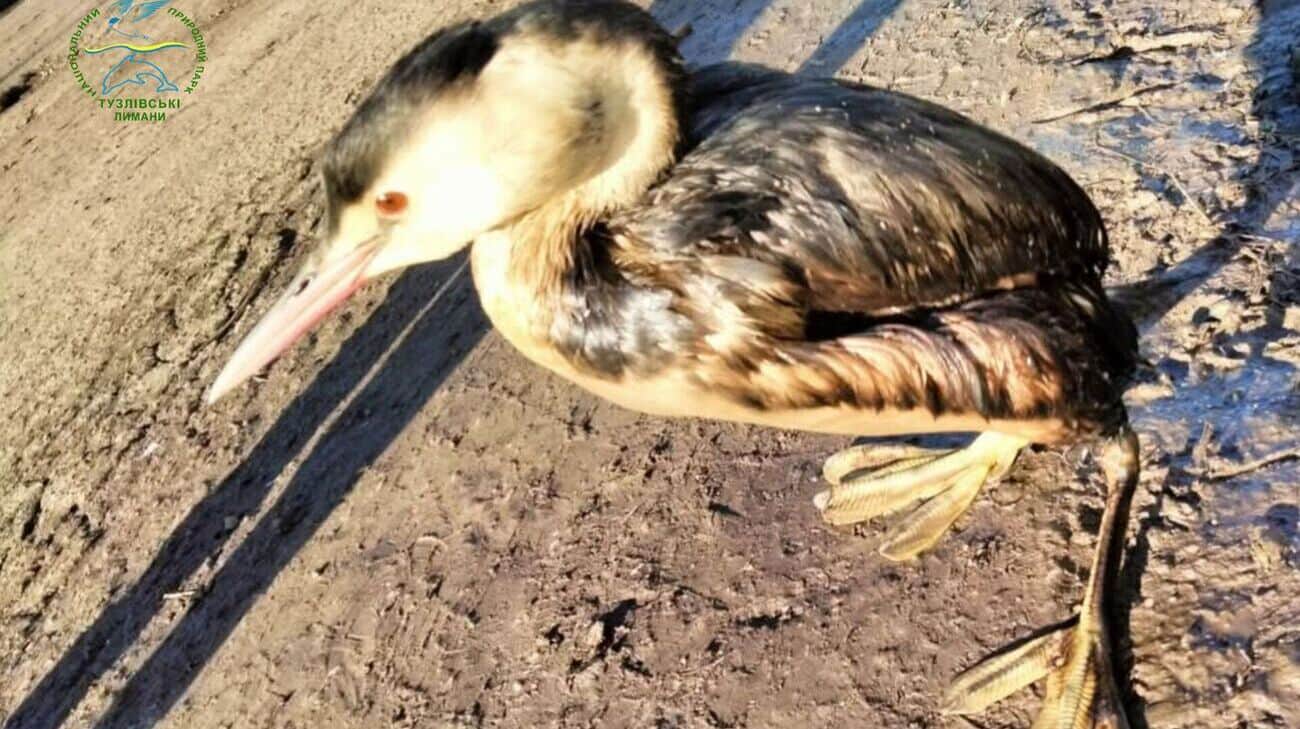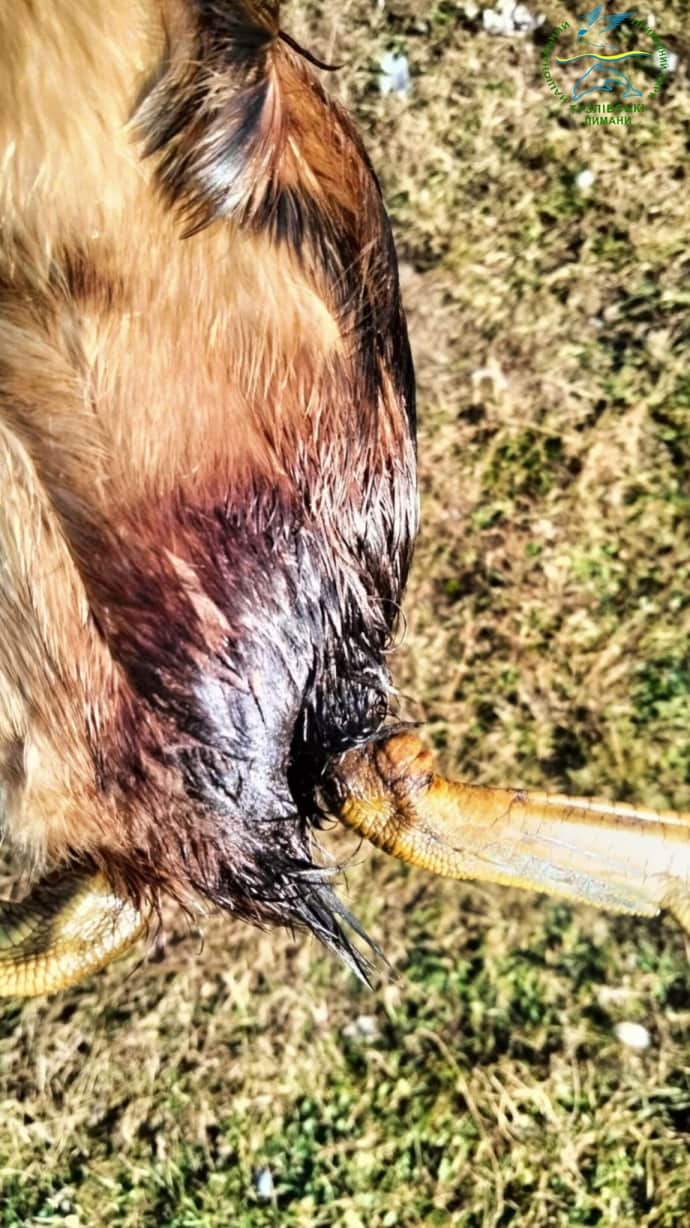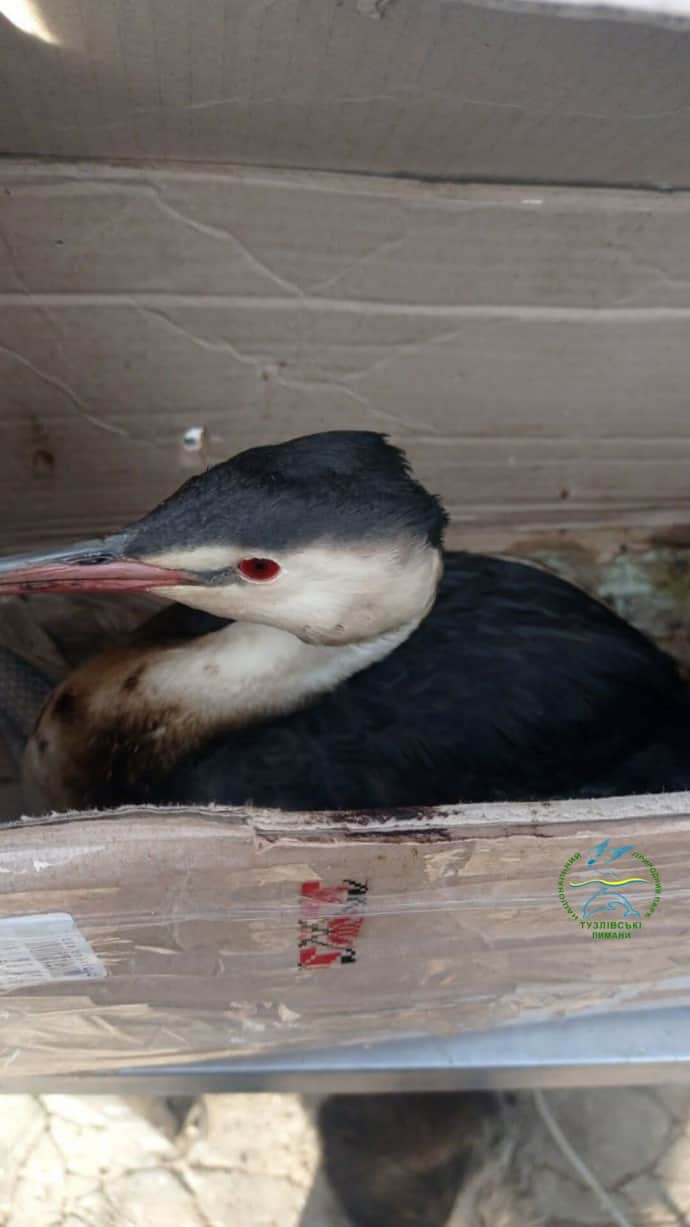Aftermath of Russian tanker accident: Birds covered in oily liquid spotted in Odesa Oblast – photos
Birds covered in oily liquid were found in the Tuzly Lagoons National Park in Odesa Oblast. The animals probably flew in after two Russian tankers sank, spilling oil products into the Black Sea. Source: Tuzly Lagoons National Park; Crimean Tatar Resource Centre, a non-governmental organisation Details: The latest case occurred on 9 January, when a great crested grebe was found in the Tuzly Lagoons with its feathers coated in fuel oil.

Birds covered in oily liquid were found in the Tuzly Lagoons National Park in Odesa Oblast. The animals probably flew in after two Russian tankers sank, spilling oil products into the Black Sea.
Source: Tuzly Lagoons National Park; Crimean Tatar Resource Centre, a non-governmental organisation
Details: The latest case occurred on 9 January, when a great crested grebe was found in the Tuzly Lagoons with its feathers coated in fuel oil.


It is believed that the bird flew from the crash of Russian tankers carrying tonnes of fuel oil, as great crested grebes can fly fast and cover long distances.
Earlier, a great cormorant was spotted in the park, which seemed to be in a similar situation. However, the bird could not be rescued from the water.
One of the birds did not survive. Tuzly Lagoons employees will send it to the Ukrainian scientific center of Ecology of Sea for examination. Experts are expected to be able to conduct laboratory tests to identify oil products and establish their connection with the Russian tanker crash.
Dr. Sci. Pavlo Holdin, a researcher at the I.I. Schmalhausen Institute of Zoology of National Academy of Sciences of Ukraine, believes that the effects of fuel oil pollution in the Black Sea will last at least 20 years.
Quote from Pavlo Holdin: "We see this on the example of previous major fuel oil accidents, both in the Black Sea and beyond. For example, the aftermath of the accident dated 2007 in the Kerch Strait is still being observed."
More details: Pavlo Holdin added that the fuel oil from the Russian tanker accident is already reaching the western coast of Crimea and can spread further west to Odesa Oblast.
At the same time, an increased mortality rate of dolphins has been recorded in the northeastern waters, the causes of which are not yet known. The researcher at the National Academy of Science suggests that mammals may die not only because of fuel oil in the Black Sea but also because of the toxic effects of ships, missile attacks or outbreaks of infections that occur from time to time.
Quote from Pavlo Holdin: "It is not certain that the dolphins are dying due to acute fuel oil poisoning, but it cannot be ruled out. Laboratory testing is required to determine the causes, which can take months."
More details: Pavlo Holdin says oil pollution can reach the coasts of Türkiye, Georgia, and Romania, and its aftermath can affect the fauna and the economy, particularly through a decline in fishing. Pavlo Holdin noted that the accident may cause marine fish and shellfish to contain toxic substances.
The zoologist argues that an environmental disaster of this magnitude is unprecedented for the Black Sea.
"I'd like to emphasise that this is a record-breaking case in the history of the Black Sea in terms of the number of fuel oil leaks, meaning that the Black Sea has never experienced a disaster of this magnitude, either in terms of the number or the area of spread. And it's hard for me to predict how exactly the clean-up will be handled," he said.
Background: On 15 December 2024, two Russian tankers began sinking in the Kerch Strait, breaking in half and causing a fuel oil leak into the water.
The ships were carrying around 4,300 tonnes of oil, most of which leaked from their tanks, creating a vast black spot in the water.
Greenpeace Ukraine stated that an oil or oil product spill in these waters could have serious consequences.
Read also: Source of pollution of Seim and Desna rivers found, restoration to take 2-3 years
"If it is driven ashore, then it will cause fouling of the shoreline which will be extremely difficult to clean up. Any environmental impact will depend on the type of oil spilled. Heavy residual fuel oils will tend to cause more visible damage than refined fractions and marine gas oil which will tend to disperse and break up quite rapidly.
Given the potential for significant environmental impacts the focus should, after rescuing crew, be to try and minimise any further spillage if possible. If the ships sink, then there is the potential for releases of oil and petrochemicals over a longer time span," said Dr Paul Johnston, Head of Greenpeace Research Laboratories, based at the University of Exeter in the UK.
In January 2025, the oil products that spilled into the sea following the accident reached the southern coast of Crimea, with fuel oil spots extending up to 15 km near the city of Sevastopol and the settlement of Kacha.
Read also: Russia has destroyed over 60,000 hectares of Ukrainian forest worth almost US$360 million
Ukraine's Ministry of Environment and Natural Resources estimates that the full-scale Russian invasion has resulted in nearly 6,500 cases of ecosystem destruction, causing damage exceeding €65 billion.
Support UP or become our patron!



